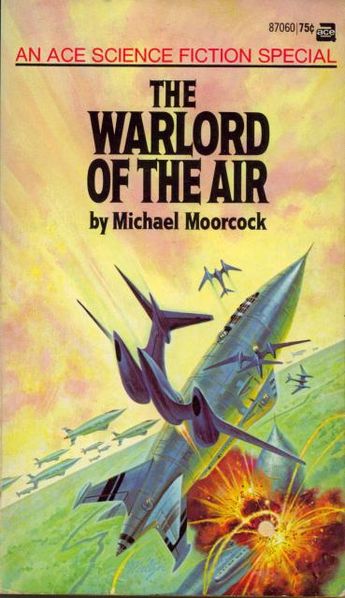One of the earliest novels that can be considered Steampunk is its proper sense was Michael Moorcock's 1971 novel Warlord of the Air. The story is considered Alternate History, but has many of the same concepts that constantly appear in First-World Steampunk.
The conceit of the novel is that it was dictated by Oswald Bastable -- the main character -- to the true author's grandfather in 1903. What Warlord of the Air details is Bastable's adventures in an alternate version of 1973, where the First World War never happened and the great colonial powers never lost their empires. The story begins with Bastable's experiences in North East India in 1902 during an expedition to deal with Sharan Kang, a high priest at the temple of Teku Benga in a region of India that's supposed to be rife with magic and supernatural powers.
Not to put too fine a point on it, Bastable is shunted into an alternate version of 1973, where zeppelins rule the skies and the great empires of history dominate their spheres of influence still. Bastable at first marvels at the seeming utopias of Britain, Europe, Japan, and the United States, and the peace and tranquility that dominates the world for those great empires. However, he quickly discovers that the reason the world of the empires is so peaceful is through the colonial domination of other nations -- "the Indian starves so the Briton may feast" (94).
Bastable is horrified by the imperialist domination he witnesses, which eventually leads him to ally with a group of anarchists who are seeking to destroy the empires. In our own world, the First World War served to bankrupt Tsarist Russia and other old colonial powers, which allowed for many of the colonial possessions to gain their freedom. Since the alternate world of Warlord of the Air didn't experience the First World War with the (relatively) tame weapons of 1914-1918, the war that Bastable and his anarchist allies end up instigating between the empires is devastating. Bastable himself witnesses the atomic bombing of Hiroshima, Japan by the anarchists and is overcome by his part in the deaths of millions of innocent people.
The atomic blast knocks Bastable free from the new world, and he wakes up in 1903 (but not his own 1903), where he meets the narrator of the framing story. By this point, Bastable is already addicted to opium to deal with his experiences and the sense of dislocation he has from being shunted between two alternate worlds. The novel ends with Bastable mysteriously disappearing; there's a "postscript" by Michael Moorcock detailing his "grandfather's" death on the Western Front in 1916.
Warlord of the Air deals a lot with the themes of colonialism and racism, and the theory that this is what could happen if the First World War didn't happen when it did. And yet, to not notice the political subtext of the story (and its commentary on colonialism) is to miss much of the point of the story. Mike Perschon (the Steampunk Scholar) brings up a very good point in his own (much better) post on this novel -- the story was written during the Vietnam War, and its choice of the eponymous Warlord's nationality may very well have much to do with the commentary Moorcock intended to make (the Warlord is Chinese).
Another point I agree with Mike on -- if this story is proto-Steampunk, there where has the political subtext and commentary gone in contemporary First-World Steampunk?


3 comments:
An interesting concept. I'd never thought that the war was also the start of Russian bankruptsy.
I guess I've never really thought of any of the political ramifications of WWI. It is so overshadowed by the more ethnically motivated WWII. I suppose the Korean and Viet Nam wars (sorry policing actions) could also be extensions of the philosophy that motivated the first war.
Sounds like a book I'd like - a good introduction to the world of steam punk. I might just learn something in the process. And I'm all for controlled anarchy :)
........dhole
Hmm, another one I might have to pick up. Thanks.
:)
I think it's worth pointing out that the Bastable stories (there are several) are part of a huge narrative structure Moorcock put together across a number of series. The other two closely related are the Jerry Cornelius stories and the Dancers at the End of Time. In fact Bastable makes a cameo appearance toward the end of Dancers, and variations on the name Jerry Cornelius appear everywhere, including the Bastable series. The whole thing is very sophisticated.
Moorcock is a card-carrying anarchist, so if you're looking for social and political commentary, you've come to the right place.
Post a Comment